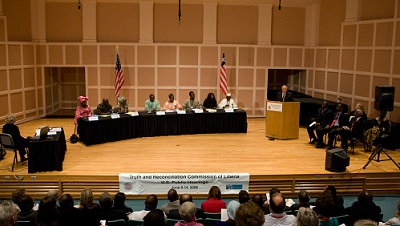
A National Peace and Reconciliation Commission. For a long time, this is what the people of Zimbabwe have been clamoring for; in the hope that such a convergence would provide the much-needed fillip for forgiveness and healing in a country now tottering on the brink of becoming a failed State.
The pace might not be breath-taking, but slowly, the tabling of a reversed National Peace and Reconciliation Commission bill to parliament recently makes the much needed convergence of the country’s past atrocities and the hope going forward a reality. It is pertinent to state from the outset that Zimbabwe peace and reconciliation efforts are never late. Political parties should as representatives of the people play their part in this congregation of nation building.
A nine member National Peace and Reconciliation Commission was appointed in 2013 but there has never been an enabling legislation that directs its work, rendering the commissioners toothless. The first bill to normalize the operation of the commission was rejected by people when it went for public hearings because of several issues.
One issue was the too much interference of the minister responsible for peace and reconciliation in the affairs of the commission which is supposed to be independent. The second issue is the bill was silent on the compensation of victims and mechanisms to deal with the perpetrators. Third, the bill was not clear on mechanisms for reporting to it by victims. Finally, the investigative powers of the commission were not clear.
However, the government has not allowed these sticking issues to stand in the way of the urgent need for all the people in the country to coalesce and mount a formidable bid for peace and reconciliation no matter how late it might seem.
The commission is a product of section 251 of the constitution and functions of the commission are laid down on section 252 as:
- to ensure post-conflict justice and healing.
- To develop and implement programmes to promote national healing, unity and cohesion in Zimbabwe and the peaceful resolution of disputes;
- To bring about national reconciliation by encouraging people to tell the truth about past and facilitating the making of amends and the provision of justice;
- To develop procedures and institutions at a national level to facilitate dialogue among political parties, communities, organizations and other groups, in order to prevent conflicts and disputes arising in the future;
- To develop programmes to ensure that persons subjected to persecution, torture and other forms of abuse receive rehabilitative treatment and support;
- To receive and consider complaints from the public and to take such action in regard to the complaints as it considers appropriate;
- To develop mechanisms for early detection of areas of potential conflicts and disputes, and to take appropriate preventive measures;
- To do anything incidental to the preventing of conflicts and the promotion of peace;
- To conciliate and mediate disputes among communities, organizations, groups and individuals; and
- To recommend legislation to ensure that assistance, including documentation, is rendered to persons affected by conflicts, pandemics or other circumstances.
The commission is supposed to be in place for a period of 10 years from the date the new constitution come into effect that is from 22 May 2013. Therefore the National Peace and Reconciliation Commission effectively remain with only 6 to start and complete its work. However, general public, and some members of House of Assembly have noted that the constitution simply says “effective date” which they believe mean after coming into operation of the current bill under consideration before parliament. Making it possible for the 10 years to be counted from the time the bill becomes law.
The commission is expected to deal with the sensitive such as:
- The Gukurahundi (early rains that wash away the chuff) massacres against mainly the Ndebele tribe where an estimated 20 000 people were killed by the fearsome red berated North Korean trained Firth Brigade in the 1980s.
- The issue of thousands victims of political violence mostly since the 2000 parliamentary elections.
- The issue of notable forced disappearances that has rocked the country since independence in 1980.
The formation of a commission of this nature is not unique to Zimbabwe. South Africa after apartheid formed a Truth and Reconciliation Commission headed by Archbishop Desmond Tutu. Ghana did the same when democracy prevailed in 1992. Rwanda followed suit when it formed the National Unity and Reconciliation Commission in March 1999 after the devastating 1994 genocide that left an estimated 800 000 mostly Tutsi’s dead and leaving over 2 million others seeking refuge in neighboring countries. In Ghana the National Reconciliation Commission was established in May 2002 to help reconcile the people of Ghana.
The Sierra Leone Truth and Reconciliation Commission established as a condition of the Lomé Peace Accord (in Togo) with the assistance of the international community in the wake of the 11 year civil war. It was signed by then President Ahmad Tejan Kabbah and Revolutionary United Front (RUF) leader Foday Sankoh on July 7, 1999.. The commission has remained vibrant and provides platform for children to learn on their country’s history and need for peaceful co-existence.

Kenya constituted its own Truth, Justice and Reconciliation Commission in 2008 after the violent December 2007 general election which left over 1000 people dead, many more injured and some scarring for cover. Seychelles recently appointed a Truth, Reconciliation and National Unity Commission to deal with the events since 5 June 1977 coup D’état and uniting the country around a common agenda for a confident future where there will be equal opportunities for all.
Most of these commissions except for the Rwanda’s commission and Seychelles’s which was set to submit its report on 31 May 2017, failed dismally to achieve their conceived aims because they didn’t provide mechanism for the victim and perpetrator to engage in finding peace and forgiveness that provide healing.
The Rwandan case is a success story mainly because it involved the community, victims and perpetrators engaging towards a common solution. The programme has been extended to schools were experts ensure justice and post-healing for children orphaned as a result of the genocide. Zimbabwe’s commission should tap into the successes of the Rwandan case and failures of other commissions and come up with an inclusive, vibrant, independent and non-partisan commission which does not subscribe to the one-size fit it’s all strategy.
The nation-wide consultation with ordinary Zimbabweans including traditional chiefs, headmen, village heads, civic groups, housewives, vendors, students and women’s groups in all the provinces shows that is important to de-elitize the commission discourse by devolving it to the people; to the villages, the farming communities and the town halls so as include all affected parties and tap into the wisdom of the ordinary people in coming up with strategies that result in truthful accounts, forgiveness and peaceful communities. The commission is also in line with section 206 of the constitution which outlines that the national security objective of Zimbabwe is make it possible for every citizen to live as equals in liberty, peace and harmony, free from fear and in prosperity.
Adrian Tawfik says
Great work Farai. You have the most honorable of messages to send here. I hope Zimbabwe can make this work.